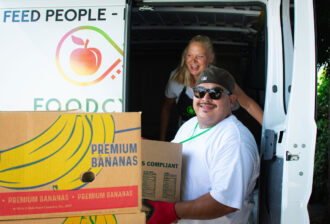Beginning in 2024, SARE had a unique opportunity to lead a one-time food loss and waste grant program funded by USDA-NIFA as a part of the Community Foods Project program. The total funding available to awardees was $8,000,000, and the application window closed on June 28, 2024. Projects were selected through a competitive process. Projects are now underway as of October 2024.
Each of the SARE Food Loss and Waste grant projects has two main requirements:
- Projects must prevent or reduce food loss or waste in a measurable way, collecting data throughout the project.
- Projects must have a strong outreach component, ensuring that other efforts around the country will have resources when they begin similar work.
The program goal is to create pathways to strengthen food rescue and get surplus food to feed those experiencing food and nutrition insecurity; reduce food loss and food waste, such as by gleaning surplus produce on the farm or finding new outlets for uneaten food to bolster supply chain resiliency or improve human and animal nutrition.
The purpose of the program is to implement outreach, training and technical assistance efforts to build capacity for food loss and waste initiatives.
Eligible groups included tribal organizations, non-governmental organizations (NGOs), community organizations, gleaning and food recovery organizations, public food program service providers, academic institutions (1862, 1890, and 1994 land-grants), Hispanic-Serving Institutions, and other colleges/universities, who are focused on reducing food loss and waste in one or more U.S. states, or U.S. territories.
The program received a large number of high-quality applications from around the country, which were reviewed in a three layer, committee-based process that emphasized the potential regional impacts of the work being done.
Fourteen exceptional projects were selected for funding. They are a diverse group in geographic location, organizational structure and size, and in the part of our food supply chain their work focuses. Over the next three years, these projects will be ongoing, preventing or diverting food loss and waste, and creating educational and training materials to ensure even more work on this issue happens in the future.
